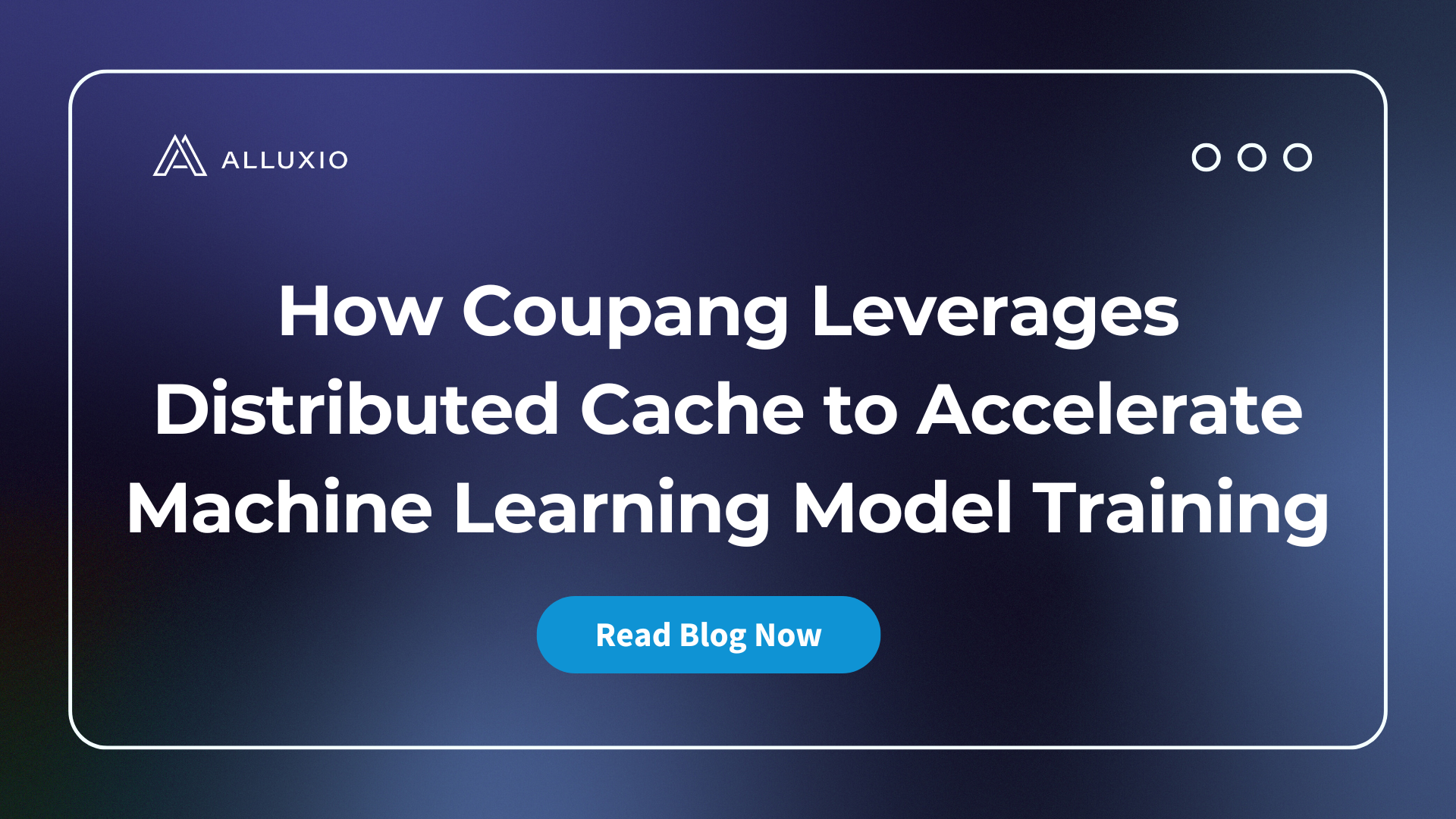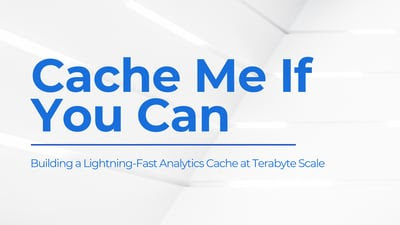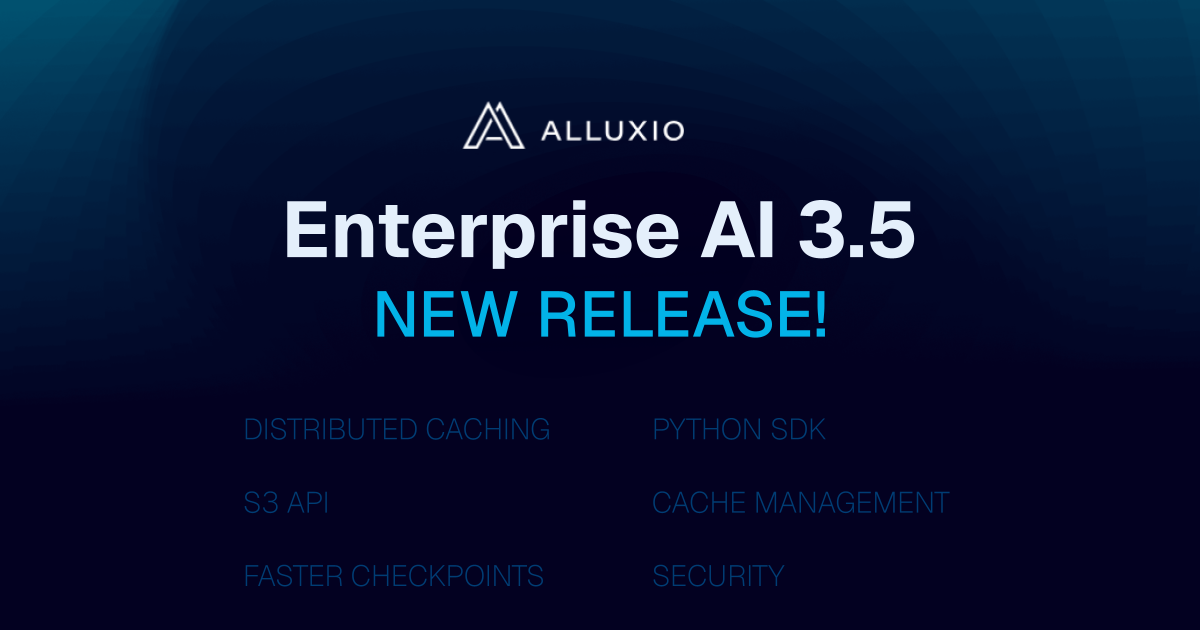Blog

Coupang, a Fortune 200 technology company, manages a multi-cluster GPU architecture for their AI/ML model training. This architecture introduced significant challenges, including:
- Time-consuming data preparation and data copy/movement
- Difficulty utilizing GPU resources efficiently
- High and growing storage costs
- Excessive operational overhead maintaining storage for localized data silos
To resolve these challenges, Coupang’s AI platform team implemented a distributed caching system that automatically retrieves training data from their central data lake, improves data loading performance, unifies access paths for model developers, automates data lifecycle management, and extends easily across Kubernetes environments. The new distributed caching architecture has improved model training speed, reduced storage costs, increased GPU utilization across clusters, lowered operational overhead, enabled training workload portability, and delivered 40% better I/O performance compared to parallel file systems.

Suresh Kumar Veerapathiran and Anudeep Kumar, engineering leaders at Uptycs, recently shared their experience of evolving their data platform and analytics architecture to power analytics through a generative AI interface. In their post on Medium titled Cache Me If You Can: Building a Lightning-Fast Analytics Cache at Terabyte Scale, Veerapathiran and Kumar provide detailed insights into the challenges they faced (and how they solved them) scaling their analytics solution that collects and reports on terabytes of telemetry data per day as part of Uptycs Cloud-Native Application Protection Platform (CNAPP) solutions.
.png)
.png)
Insights from from Uber, Snap, and Alluxio on LLM training, fine-tuning, deployment, designing scalable architectures, GPU optimization, and building recommendations systems.

With the new year comes new features in Alluxio Enterprise AI! Just weeks into 2025 and we are already bringing you exciting new features to better manage, scale, and secure your AI data with Alluxio. From advanced cache management and improved write performance to our Python SDK and S3 API enhancements, our latest release of Alluxio Enterprise AI delivers more power and performance to your AI workloads. Without further ado, let’s dig into the details.

We are thrilled to announce the general availability of Alluxio Enterprise for Data Analytics 3.2! With data volumes continuing to grow at exponential rates, data platform teams face challenges in maintaining query performance, managing infrastructure costs, and ensuring scalability. This latest version of Alluxio addresses these challenges head-on with groundbreaking improvements in scalability, performance, and cost-efficiency.
.jpeg)
We’re excited to introduce Rapid Alluxio Deployer (RAD) on AWS, which allows you to experience the performance benefits of Alluxio in less than 30 minutes. RAD is designed with a split-plane architecture, which ensures that your data remains secure within your AWS environment, giving you peace of mind while leveraging Alluxio’s capabilities.

PyTorch is one of the most popular deep learning frameworks in production today. As models become increasingly complex and dataset sizes grow, optimizing model training performance becomes crucial to reduce training times and improve productivity.

Co-hosted by Alluxio and Uber on May 23, 2024, AI/ML Infra Meetup was the community event for developers focused on building AI, ML and data infrastructure at scale. We were thrilled by the overwhelming interest and enthusiasm in our meetup!
.jpeg)
This blog post delves into the history behind Trino introducing Alluxio as a replacement for RubiX as a file system cache. It explores the synergy between Trino and Alluxio, assesses which type of cache best suits various needs, and shares real-world examples of Trino and Alluxio adoption.
.jpeg)
Performance, cache operability, and cost efficiency are key considerations for AI platform teams supporting large scale model training and distribution. In 2023, we launched Alluxio Enterprise AI, for managing AI training and model distribution I/O across diverse environments, whether in a single storage with diverse computing clusters or in a more complex multi-cloud, multi-data center environment.
.jpeg)
This article was originally published on Spiceworks. https://www.spiceworks.com/tech/artificial-intelligence/guest-article/adapting-ai-platform-to-hybrid-cloud/
This blog discusses the challenges of implementing AI platforms in hybrid and multi-cloud environments and shares examples of organizations that have prioritized security and optimized cost management using the data access layer.
.jpeg)
GPU utilization or GPU usage, is the percentage of GPUs’ processing power being used at a particular time. As GPUs are expensive resources, optimizing their utilization and reducing idle time is essential for enterprise AI infrastructure. This blog explores bottlenecks hindering GPU utilization during model training and provides solutions to maximize GPU utilization.
.jpeg)
This article was originally published on ITBrief. The author is Hope Wang, Developer Advocate, Alluxio.
As we celebrate International Women's Day, it is important to reflect on the progress we have made toward gender equality in the tech industry, particularly in open-source software (OSS). While there is still much work to be done, I am proud to be part of a community actively working to empower women and promote diversity. In this article, I want to share my path to the open-source community and offer advice to women developers interested in contributing to open-source projects.
.jpeg)
In the rapidly-evolving field of artificial intelligence (AI) and machine learning (ML), the efficient handling of large datasets during training is becoming more and more pivotal. Ray has emerged as a key player, enabling large-scale dataset training through effective data streaming. By breaking down large datasets into manageable chunks and dividing training jobs into smaller tasks, Ray circumvents the need for local storage of the entire dataset on each training machine. However, this innovative approach is not without its challenges.

